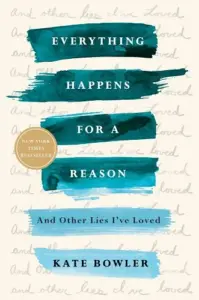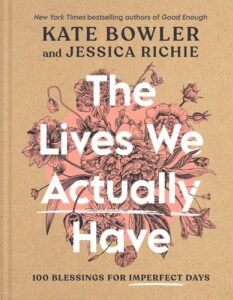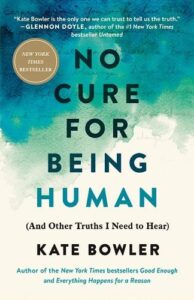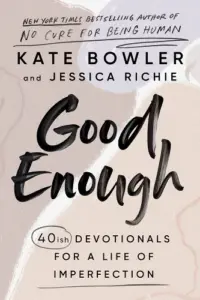Kate Bowler
On Being in a Body
We love the theologian Kate Bowler’s allergy to every platitude and her wisdom and wit about the strange and messy fullness of what it means to be in a human body. She’s best known for her 2018 book Everything Happens for a Reason (And Other Lies I’ve Loved) — a poetic and powerful reflection on learning at age 35 that she had Stage IV colon cancer.
From a reset on how to think about aging, to the new reality in our time of living with cancer as a chronic illness, to the telling of truths to our young, this beautiful conversation is full of the vividly whole humanity that Kate Bowler singularly embodies.
(Also, as you’ll hear, if she hadn’t become a theologian, she might have been a stand-up comedian.)
Krista and Kate spoke as part of the 2023 Aspen Ideas Festival.

Image by Gabrielle Touchette, © All Rights Reserved.
Guest

Kate Bowler is the author of several beloved books, including Everything Happens for a Reason (And Other Lies I’ve Loved) and most recently, The Lives We Actually Have: 100 Blessings for Imperfect Days. She is an associate professor at Duke Divinity School and made an early name in her field of American religious history with her 2013 book Blessed: A History of the American Prosperity Gospel. She also hosts the podcast Everything Happens.
Transcript
Transcription by Alletta Cooper
Krista Tippett: I love the theologian Kate Bowler’s allergy to every platitude; her wisdom and wit about the truly messy fullness of what it means to be in a human body. Her wisdom has been hard-won, at a young age. She’s best known for her 2018 book Everything Happens for a Reason (And Other Lies I’ve Loved). It is a poetic and powerful reflection on how she moved through learning at age 35 that she had Stage IV colon cancer. At that time, Kate was told that she would probably die very soon. She had a husband she’d loved since she was 15, and they had a very young son. I read her book again in preparation for this conversation with such admiration, several cathartic years later and a changed Kate, in a changed world. From the new reality in our time of living with cancer as a chronic illness, to the telling of truths to our young as we face precarity in our collective body, this conversation is full of the vividly-whole humanity that Kate Bowler singularly embodies. And, as you’ll hear, if she hadn’t become a theologian, she might have been a stand-up comedian.
[music: “Seven League Boots” by Zoë Keating]
I’m Krista Tippett, and this is On Being.
Kate Bowler is an associate professor at Duke University Divinity School. She made an early name in her field of American religious history with her 2013 book Blessed: A History of the American Prosperity Gospel. She grew up in Canada in a proud, old Anabaptist tradition — that’s a part of the Christian Reformation family tree from which the Amish and Mennonites emerged. I was so grateful to speak with her before an audience at the 2023 Aspen Ideas Festival.
[applause]
Tippett: So, hello everyone. I’m very happy to be here at Aspen Ideas, and here for the first time, and with the incredible Kate. I actually think of Kate Bowler every time I look at the coffee cup in my office that she sent me, which says, “No Cure for Being Human,” which is the title of another of her books, which have touched millions.
So as I believe you know, I often start my interviews with a question about the spiritual background of a life or a childhood because I find that that is such a soft, searching place in us, and it’s often a place where a lot of the questions that we end up pursuing for the rest of our lives emerge. And that spiritual background can be anything. It can be a presence, it can be an absence — but there’s something there. But you have such an interesting beginning. So would you just tell us a little bit about this spiritual background of your childhood?
Bowler: Oh, yeah. I guess it’s a bit of a grab bag. My mom is probably the only person in the world who was converted by a tract.
Tippett: By a what?
Bowler: A tract. Like a fold-out, threefold. She was walking in a student center and someone handed her a tract and she was, “Me? Sinner in the eyes of God? Well, all right.” And then that was it. And she’s this really smart lady; she has a PhD. She’s a joy. And I just really love that about her. And so she became a Christian kind of later in life, and my dad read Augustine and he thought, this is a worldview.
And their discovery of spiritual questions as being the thing that you can learn to hang all of your thought hooks on was something that I watched them experience. And it made me feel like spiritual questions were the kindest, most interesting, nosiest way to get to sort of the “marrow of the universe” feeling. And then we went to a Mennonite church. So it’s all just cheese eaters and furniture makers.
Tippett: In Canada.
Bowler: Yes. Right in the middle of Canada, in the lesser-known part of Canada.
Tippett: I’ve never done this before, but you write so wonderfully about the Mennonites. So I want to read some of your favorite lines, my favorite lines about your religious homeland. You said, “I grew up on the prairies of Manitoba, Canada, surrounded by communities of Mennonites. I learned at my Anabaptist Bible camp about a poor carpenter” who taught that a simple life was a good one. “Though most Mennonites abandoned bonnets and buggies long ago … they kept their concerns about the greediness of modern life.”
You also wrote, “I had been taught in my Anabaptist Bible camp that there were a few things closer to God’s heart than pacifism, simplicity and the ability to compliment your neighbor’s John Deere Turbo Combine without envy. [laughter] Though Mennonites are best known by their bonnets and horse-drawn buggies, they are, for the most part, plain-clothes capitalists like the rest of us. I adore them. I married one.” [laughter]
And finally, “Mennonites are people with the land in their blood and a hopeless obsession with simplicity, frugality, pacifism, and Jell-O salads … I’m pretty sure they are genetically predisposed to singing in four-part harmony and making thick braided breads and homemade jam.”
Bowler: [laughter] That’s right. Yes, they have some kind of pact with Satan for the gift of song. It’s very strange. But yeah, what they can do with Jell-O. [laughs] I found a deli meat, sliced deli meat, one time, and I stood at a buffet table. I was like, “Who did this, take responsibility?” So they really are a wonder.
Tippett: So I think I’d love to ask, what in that spiritual formation of your childhood, that universe unto itself, taught you about being in a body, and maybe came back to you with comfort or vexation or confusion when your life as a young woman, as a young mother, took that unexpected turn?
Bowler: I guess because illness was that feeling of being stripped down to the studs, and you’re the bare bones of something. And that was maybe this most important moment in which I realized I’m not very much a life — any life isn’t very much on its own. And Mennonites were the ones who really taught me how to be a group, how to be a weird, moving, alive, symbiotic herd. They just kind of move in, and they’re just tapping on your fence boards trying to figure out which is rotten, and then they’re — without your permission — taking your house apart. And that’s exactly the energy that I needed when I knew that most of my life was unfeasible.
I was going to have medical bills I couldn’t pay. I knew I would likely cause most of the people in my family to have to take out loans against their crappy bungalows. I was going to take them all down. And so to have all of them kind of lift me up and feed me so aggressively was exactly what I needed.
Tippett: Somewhere you wrote, “perhaps the most oddly comforting thing about joining the Mennonite club: they insist that suffering never be done alone.” I do want to also note that the scholarly work you did in that chapter of your life, which took this turn, but as you moved into this, you were a professor. And it might sound like there’s no connection between these two things, but actually, this research you did and this writing you did was much more than tangential, ultimately. So I want you to talk about that. But I did really appreciate this confession in your book where you did all the things, including wailing, that one would expect. And you said you also confessed, one of [your] first thoughts when you got this diagnosis was also, Oh God, this is ironic, I recently wrote a book called Blessed. And this actually also — just before we leave the Mennonites behind — started with you getting really fascinated by hearing about a new Mennonite megachurch.
Bowler: I couldn’t believe it. It broke a part of my brain that puts information together, because I was on the one — Winnipeg, Manitoba, the glories of the prairies, please visit, has only one fast road. And they put a traffic light up on it. And I was sitting there at the light full of Christian rage, and I thought that I was watching a factory empty. And it turns out that this pop-up building was in fact a megachurch in the middle — Canada’s largest megachurch — and that it was mostly attended by Mennonites. And that people I knew had recently contributed to Pastors Appreciation Day in which their pastor had been given a motorcycle. And then he rode it around on stage.
I was like, “Absolutely not. This is for Americans.” [laughter] And I went on such a tear about it. But the question that stayed with me is, what is it about all of us that wants a story about God’s special love that then would yield itself in health and maybe in some wealth and maybe in the family wholeness and togetherness? And I thought, “Well, if it can happen in Mennonite world, it can happen in anywhere.” And that truly began an obsession.
Tippett: And so you went down this rabbit hole of what is known as the prosperity gospel, which is a Pentecostal movement. And that’s such a big wide story also that we don’t have time to go into here. But I want to say in this room, it’s so easy to make fun of something like the prosperity gospel and some of the ways that it gets reported and caricatured when we are secular and erudite. What I really appreciate about the book you wrote — and you have your critique, which one would have of anything one was studying closely enough — but I appreciate how you so looked for what is human and understandable and what this particular religious movement also says about the rest of us.
So here’s a passage: “I did discover that the prosperity gospel encourages people (especially its leaders) to buy private jets and multimillion-dollar homes as evidence of God’s love. But I also saw the desire [for] escape. Believers wanted an escape from poverty, failing health and the feeling that their lives were leaky [buckets]. Some people wanted Bentleys, but more wanted relief from the wounds of their past and the pain of their present … They wanted a modicum of power over the things that ripped their lives apart at the seams.” When you see it that way, you realize you’re seeing the human condition, and you’re also seeing the American dream.
Bowler: Yes. Yeah. I thought I’d written a very gentle history, but I didn’t feel a strong sense of identification with the desperation of their prayers and hopes until I was the person praying. Without the ugly kind of crying in prayer, the undignified sort of, “God save me, save me.” Most of my prayers waking up were just like, “Save me, save me, save me, save me, save me. I don’t want to do this. I don’t want to do this anymore. Make me someone different. Isn’t that in your power?”
And that sounded exactly like prayers that I had listened to for a decade, and I thought, “Well, wasn’t I a bit never quite above it?” And that breaking apart feeling has oddly served me very well, because now I feel kind of back to the basics of, these are the things I wanted all along. I wanted to know that it was possible to grow up and develop gifts that you then get to use in the world. And to see any dream come true feels like a miracle. But when it’s yours, you’re like, “Man, didn’t I really hope that I deserved that?”
Tippett: Some of the things — what it identified for you is something like how we, even though if you just have a normal life, you know this isn’t true, but we kind of expect life to be fair.
Bowler: Yes. Yes. Absolutely.
Tippett: And we’re really shocked when it isn’t.
Bowler: Yeah. I feel like wherever you drop the anchor in your story about spirituality — or I’m just thinking a big theological framework — if you drop the anchor on, “We are made good, God loves us,” it’s a pretty short road to, “Well, if God made me to love me, shouldn’t, therefore, some things maybe work out for this poor hapless creature?” And so I had really imagined that there was going to be a strong causal relationship, just like it is in the prosperity gospel: Is God good? Is God fair? And I wanted fairness in a way I’d never wanted before.
Tippett: So that was really present. Even though you’d been observing these things as an academic, I think you found that those sets of assumptions were very much alive in you when you got your cancer diagnosis and how you moved into that.
Bowler: And part of it was, I remember reading a history of the middle class and it said they rely on optimism, hard work, and a sense of lightly proximate horizon. They’re good at future thinking. And I was like, “Oh, crap, I thought that was my personality. But it turns out I was just middle class.” So that’s disappointing. [laughter] But I think part of my belief in a meritocracy came from the fact that I really did grow up believing that if I scrapped it out, that out of anything, I could count on my hard work.
Tippett: Yeah, and you were led to believe, you were trained and educated to believe that — all of us were.
Bowler: There is a part in academia where you do assume it’ll break your heart at some point; you should probably just give up on the meritocracy. But it was in there, it was really in there somewhere.
Tippett: So it turns out it’s not fair. It turns out all those things you believe are not true and you’re on the other side of those assumptions, and you inherit a lot of things, one of them is a vocabulary. You describe it as this foreign country of cancer, and suddenly there’s this new language that you’re supposed to be fluent in. And then these identities are very statistical and dehumanizing really: Stage IV. 30-percent chance. Survivor. Remission. Incurable.
Bowler: Yeah, I remember trying — just the slipperiness of all the language, you say something like, “Hey, not to put you on the spot…” but I’m — coming out of surgery, I’m like, “Hey, not to make you feel weird, but would you mind just looking at my chart and telling me what are the chances you think that I might live?” And I say it in a tender way when the lights are still out in the middle of the night in the hospital and I don’t want to put the guy in a weird position, but I just want somebody to be honest with me. And then I can see how quickly this poor young doctor has to translate it into the language of outcomes, because they can’t speak the language of certainty. But we’re just floating far away. And then, I don’t know —
Tippett: So it’s the most embodied thing, and what you’re getting is completely cerebral.
Bowler: Absolutely. Yeah, and they’re trained — I had the weirdest moment where — I apologize so much for the words that I’m about to use, really.
Tippett: It’s okay. I’m not on public radio anymore. I don’t have to bleep.
Bowler: I can tell the dread of what I’m about to describe. This resident came in and in my normal hospital room, and he was like, “Ms. Bowler, we’re going to remove a drain, and you’re just going to feel a deep pinch and a hard pull. And then you’ll be able to go home.” And I was, “Wait, you’re going to take something out here, now, in this normal room where everything is — there’s a window, there’s no one else here. It’s just you.” And he had been my most dispassionate doctor, where we were in other planets together, apart, far apart. [laughter] And so he walks toward me like this, and I was, “Oh no, we cannot have our hands up, like a terrified magician when you come up to me.” [laughter] So I was, “If you wouldn’t mind just, and not to be trying to be weird, but could you just leave and then come back and pretend to be a magician so that I can go into a different mental place for you to do this?” So yeah, he came back in, there was a lot of saying, “Knock, knock, knock,” because it was just a curtain.
Tippett: He really did it?
Bowler: He left the room, he came back in with his hands raised, and he was, “Knock, knock, knock.” And I was, “It’s just a curtain.” He comes in, he’s, “All right, close your eyes. Deep pinch, hard pull.” And it was the most intensely internal feeling I’ve ever had. And then he pulls and I open my eyes and my blood is all over his white gown and what looks like 200 feet of tubing is in front of us. And he has his hands up still. And he goes, “Ta-da.” [laughter] And I was like, “That’s it, we’re people, we’re both people again.”
[laughter]
Tippett: That must have been a bit of a relief.
Bowler: He comes to my lectures. [laughs] Yeah, we’re like buds now. But the truth is I needed one person to cross the divide from doctor-world into magician-world. And he did it.
Tippett: It just feels like there’s all this mind-over-body, mind-over-matter in jiu-jitsu, when actually, the primacy of the body, which has always been true, is just asserting itself.
Bowler: Yes, that’s so true. And even when you get terrible news, I found that I was just — honestly, the most precious thing in the whole world to me is right before any surgery, everyone leaves, and it’s the worst moment in the whole world. And you really don’t get to control anything that’s going to happen. And until that, you exercised what you felt was agency, and you advocated for yourself, and you looked things up on the internet. And in that one moment, you realize that for the most part, your body — you’re going to be a passenger in whatever happens to you. And then they wheel you down a hallway, and then all of a sudden, everything’s very cold, because they keep those surgical theaters nice and crisp. And in that one moment, I swear to God, every time, all I’ve ever wanted is for one person just to reach out and to grab my hand. And in that moment, someone always sees the fear in my eyes right before the mask goes on, and like, just to feel that little squeeze. In that moment, you’re a body again, right at the moment where you have to let it go. And learning to let it go. And then, how to try to step back into your body is probably one of the weirdest things I’ve ever been trying to get used to.
Tippett: Wow. So in contrast to all of that statistical language, a word that seems to have felt so true to you early on is “precarity.” Would you talk about what that word means to you now?
Bowler: Oh my gosh. Dorothy Day, the Catholic activist used it so beautifully to talk about a life living in New York in community with people with insecure housing. And if you compare how she describes it with other theologians who imagined a stable universe full of certainties, I just love the way she describes precarity as contingency, the fragility of your life, that feeling like things can be taken away in an instant. But not like it’s a bad thing, that it’s not the thing that we have to get over to get back to the person we were before. And I found that really emotionally satisfying, because what if the new is just the way it’s always going to be? And that I — never imagining that a return to a solid foundation is probably braver existential work than I had been ready to do, but that I need to be ready to do.
[music: “Checkered Blue” by Blue Dot Sessions]
Tippett: I wonder if you’d also talk about really how your sense of time utterly shifts on so many different levels.
Bowler: Yeah. Well, yeah, right, with outcome language and the pretend certainty of — like for the first year, I thought that all of it was the last time. So it was the last Christmas, it was the last spring buds, it was the last everything. And that had a beautiful and terrible beauty to it. And also as a nightmare for family experiences in which you’re like, “We’re having an amazing experience!” [laughs] You’re shrieking into the wind.
But after the initial sort of cliff became more kind of vine-to-vine feelings, I got really good at the interval between scans. So at first it was three months, and I got amazing at 90 days. I could get a scan, make a new plan, live a life, throw a costume party, [laughs] just take a trip. And then it kind of became six months, and now it’s been a year. And the beauty of that is I can feel the fullness of how life, how much — it’s almost like I need so much life to be on one side of the seesaw in order to manage how terrified I am to walk up to the edge again. So I don’t know how to live exactly with life as a chronic condition, but I did know how to think about horizons in a way where I knew how to right-size my hopes and relationship to time.
Tippett: Yes. And so it turned out that there were three different kinds of cancer this could be. And the third one, which they called “the magic cancer,” a theme in your health journey, meant that it was treatable.
Bowler: That’s a perfect word. I wouldn’t have used that word. And I think that’s right.
Tippett: Is that a good word?
Bowler: Yeah, that’s a perfect word.
Tippett: I have to say, one of the things you are so clear about is how awkward we are, not only with our own suffering, but with the suffering of others. And if I say anything up here that is not good, you tell me, push back.
Bowler: Oh my gosh. Your poetry with words really does help with the — because most of the words we use are just blunt instruments. I remember this one woman sat down with me over dinner, and she turns to me and she goes, “And you’re terminal.” And I was, “Oh, no, no, terminal means I know for sure when I’m going to die.” And she goes, “Good for you.” So I was just being a consummate little positive thinker. And I have treasured that. [laughter]
Tippett: But wait, a story I really like that you tell is, I think you’re wearing a Tonya Harding costume at a party. [laughter]
Bowler: Oh yeah. That’s right. I forgot about that. I was dressed as Tonya Harding, and we were all dancing, and someone looks over across our group and is, “So I guess you didn’t die.” Or something like that. And I was just like, “Not yet.” You’re not really sure what you’re supposed to say. [laughter]
Tippett: I think you also wrote: I said not yet, internally reconsidering my commitment to passivism.
Bowler: Oh my gosh. Yeah. There was a lot of like, “Things will be great in heaven, as your heaven is your true home.” Which is like, “Do you want to go first?” [laughter] It’s really awful and wonderful and terrible. And I do it all the time to other people. That desperate effort to connect with people means that I’m bringing up awful issues all the time. They’re like, “Actually, this is a children’s birthday party, Kate. So not really where I want to talk about my bladder cancer.” That’s fair. [laughter]
Tippett: Okay. Let’s go back to time. We’ll probably come back to this, but all right, also this image of when something like this happens, and I think maybe all of us have our own personal individual example of what that something is, there’s a before and there’s an after, and all of life is divided that way. I think the pandemic was that civilizationally. That’s also a different way of living in time. And I wondered, as a theologian, because I’ve been thinking a lot in these last years of the pandemic of the biblical notions of — and it’s not just the ancient Greek, which also translated into New Testament thinking that — of Kronos time and Kairos time. Did you think about that?
Bowler: Well, okay tell me Kronos versus Kairos again, because now you’re being a beautiful and cosmopolitan lady, and I want you to say it.
Tippett: Kronos is actually the way we organized our society as though it works like a clock. It’s Newton. It’s one thing follows the other, and it’s the time of deadlines and schedules and calendars and accomplishment that is progressive across time. And then Kairos are these moments of inbreaking that disrupt everything that came before. And it can be an instant, and it can be a century. I think we may be in one of those centuries.
Bowler: Yes. That’s lovely.
Tippett: But it is this, it’s the Before and the After with a capital B and a capital A.
Bowler: I guess I thought a lot about — my friend Luke Brotherton said this where he was, “Oh, you’re in apocalyptic time.” And I was like, “Ooh, creepy and yes.” Because it has the sense of fragility: the world is about to end, even if it’s just yours. We’ve felt it collectively. I remember taking a class on apocalypticism in 1999 with Y2K, and we were all like, “What’s going to happen?”
Tippett: Yeah.
Bowler: But where we sense collectively our fragility, and then we are likely to make rash decisions, which is actually one of the fun parts.
Tippett: I can’t believe this is escaping me, but what is the actual Greek word? What does it mean, “apocalypse”? It doesn’t mean the cataclysm to end all cataclysms.
Bowler: It’s revealing.
Tippett: It means a veil being lifted.
Bowler: Yeah, which you see the bright clarity of a proximate ending, and then some people thrive in that scenario, and then other people —
Tippett: And it’s very hard on most of us.
Bowler: Yeah, we can’t live there forever.
Tippett: No, we can’t live there.
Bowler: And then as opposed to Ordinary Time, which is how most calendars are organized, or religious and otherwise. And then “tragic time,” which is this — the slowness in which you can walk outside and wonder why anyone would have the right to eat a decorative salad, because, don’t you know that? And that feeling of “don’t you know that?” which is also an intense liminal season. And we also can’t live there forever.
Tippett: I see you got very, very impatient — you probably still are — about people complaining about aging.
Bowler: [laughs] I try to be nice. I do. I am kind of a dick about it though, depending. Yeah, I guess maybe for a bit. I think it was in part because I would reach the edge of my brain every time people were planning for retirement. And I just couldn’t picture the sort of stability that lets people’s brain unravel into these nice long loops. And so yeah, at birthday parties, retirements, I wasn’t at my best. But in my defense, I work with almost exclusively 75 to 80-year-olds, because I live in one of the only remaining gerontocracies: the university, which I cherish. And so all of my friends were 80, and they understood, they agreed that it was ridiculous.
Tippett: But also I think you would deploy your fantastic wit, because what a luxury, what a privilege it is, to age.
Bowler: Yes.
Tippett: For you, looking at another life where you were measuring your life in two-month or three-month or six-month increments. Cancer has become a chronic illness in our time, which is miraculous, but also a very new way to live. Because when you would go for your two months, you were only given another two months to live, you weren’t given the rest of what you would’ve thought would be the rest of a life.
Bowler: I think, too, I was feeling so frustrated with — I’d had this very surreal experience where I wrote an op-ed, but accidentally included all my information very close to the end, where Gary from Indiana could email me. And there was a lot of Garys from Indiana who wrote to suggest advice for how to live. And in their versions of, “In my long life, I’ve learned that — ” And I think that just broke a part of my heart that imagined that I would see all the accumulation of everything I’d ever worked for, especially in the university where every book takes a decade, so we think —
Tippett: Yeah. And you had done it. You were walking that path.
Bowler: Yes. Let me feel it. “Let me feel it, Gary.” Only one time, though — truly a guy named Gary from Indiana — wrote me this super jerky note on a church bulletin and then mailed it to me, which was a brave move, because his church’s email address was right there. And so I just emailed Gary’s pastor: “Dear Gary’s pastor, I am a professor at a divinity school. I also teach pastors. We can imagine that Gary was not listening during your sermon.” So that’s what I needed in that moment. [laughter]
Tippett: Did you ever hear how that story went, if the pastor sat Gary down?
Bowler: I didn’t. T.B.D.
Tippett: So I really want to ask you about God, which is such an inadequate little tiny word that doesn’t even — something we’re pointing at rather than describing. One thing that occurs to me is — I think about this a lot, and I thought about it a lot immersing in you and your story — it is such a strange thing about us as creatures that we have to hit bottom or face our mortality, that we have to come to the end of what we thought we knew and where our capacities give out, to often grow and deepen in ways that were not accessible to us before. So that’s a little about us — I don’t know, it feels to me like it’s a little bit about, if you believe in God, what does that say about us? What does it say about God?
Bowler: Right. Well. Yeah. And that is, I think, one of the hardest things to summarize, which you just did so beautifully about the, “unless we feel our own breaking, it is hard to grow.” And yet our culture has descriptions for that. That “everything happens for a reason,” or that “it made me who I am today.” And none of those get to, they don’t encapsulate the fear. Oh my gosh, the fear of waking up in the morning and thinking it was a dream and then remembering again. The feeling like not a bit of your effort is ever going to remake what you’re losing in what you’re taking away from everyone else.
When I think about what my spirituality means in the context of cancer, I mostly think of that. Not the easier bits where I could re-attract, or have a worldview anymore. I needed the — It’s a feeling where your toes are curled over the edge and you can sort of feel the upward draft. And I needed in that to know that there was a God who could love me in that situation without me then believing that my love was going to earn me back what I had lost.
So I think that was one of the weirdest experiences I’ve ever had, really, was I had been kind of an earner, striver type, as you can imagine, especially even with spirituality. I wanted to be good. And then in the hospital, as I felt so angry and so broken, I felt really, really loved, bizarrely loved by other people, but weirdly also about God. And I really kept that to myself, because it felt embarrassing, honestly, and hard to describe. Because it didn’t mean that I wasn’t unbelievably angry. I just felt somehow cherished in my one ridiculous life. Like my death would matter even if it felt like it wouldn’t matter.
Tippett: Did you inherit some of that from the spiritual world of your childhood? I guess I wonder, I wonder if — because a lot of people get that. I also had a religious upbringing that I wouldn’t return to in that form. But I feel like I did. This was transmitted to me that behind this world there is love. And I wonder, and it sounds like you had that, too, and it came back to you in the most improbable time.
Bowler: I don’t think I’d ever felt this sort of strange — we’re getting to the edge of my ability to describe things well — but transcendent feeling. As much as I am a massive emoter, I haven’t had a very emotional spiritual life. I just kind of had a set of beliefs that I really liked and kind of kept on trucking.
Tippett: So often true of theologians.
Bowler: So I was like, this looks good and it fits together and great. [laughter] But the feeling where I didn’t even know who I was anymore, except that I could tell that one hook I could hang it on was the knowledge that somehow I was loved. Like lily-in-the-field loved, bird-in-a-tree loved. But I think I had spent so many months before I got diagnosed, being treated so badly by the medical profession. I had been turned away so many times for care. And so by the time I got there, it was Stage IV. And that feeling of being worthless. Honestly, I think that was the — sorry — that was, I felt worthless. So to feel loved felt like bonus. [crying]
Tippett: I wish I were sitting closer to you.
Bowler: I would ruin that jumpsuit. Sorry, I never bring Kleenex. I really regret it. [laughter] Oh my gosh, thank you. Ultrasoft.
Tippett: So we have just lived through this collective trauma facing our mortality with the pandemic, with so much loss and such an experience of precarity. And I think that these patterns that you describe and this need to control — which is so natural, so understandable — to control the narrative, was also directly present in this. And you gave the commencement address at Macalester. And what was —
Bowler: I went to this hippie school that I love so much, Macalester College, just a drum circle away if anyone ever wants to visit. It’s great. [laughter]
Tippett: So what was it? It was the 2021 commencement for the class of 2020 and the class of 2021.
Bowler: Oh my gosh. Those poor sweeties. Like they got nothing.
Tippett: And you said to them, “It is my great privilege not to lie to you.”
Bowler: I’m like the worst commencement speaker ever. [laughter]
Tippett: No, you weren’t.
Bowler: There will be no reaching for the stars. There will be no “anything is possible.” [laughter] But I felt so bad for them, because they graduated into just nothing. And then these poor little stragglers came back a year later to put their hat on. And I was so happy for them. But it felt — it was perfect for me, because I could go to a group of survivors and just say, “Wow, we really are changed, aren’t we? And the regular probably kind of platitudes won’t work on us, will they?”
Tippett: But I don’t think we’re saying that out loud enough. And again, it’s understandable, but we really want and physically need in our bodies to know that it’s going to be okay and that we can get back to normal. And in fact, you wrote somewhere about so many people who were so bad with your suffering, were so bad with somebody else’s suffering. But you had this friend who was a pediatric oncologist, Ray, and I feel like you offered these college graduates the better of the graceful, generative presence that he offered you.
Bowler: He was so good to me. Because it was one of those — pediatric oncology, that is a ministry and a calling. And what I learned from him and from other doctors who are so good at that feeling — because what I realized, what hope is, isn’t sort of skipping to the end, “Just tell me everything’s going to be okay,” which is wonderful, too. But it’s the feeling where someone keeps pace with exactly where you’re at and helps you find the edges of what you can hope for.
And so I got great advice. Like when you make a hard decision — I had to make a decision about this really intense liver resection where I could either choose to take almost all of it and maybe die on the table, take almost part of it and then most of the cancer would grow back, it was all bad choices. And he was like, “Whatever we decide — ” and he kind of let me run to the end of my thoughts, “ — we’ll put it on the calendar and we’ll say ‘In this moment, I can say to myself and others I really did the best with what I knew.’” And in all of our hopes, it feels good to say not “everything is possible,” but what is possible today. And then emotionally land on that in a way that’s satisfying — that felt like wisdom to me.
Tippett: I was really struck by how he asked you. Did he say something like, “How are you doing? Are you doing — ”?
Bowler: I don’t remember this.
Tippett: Something about, he said —
Bowler: It’s weird when it happens to you and later you’re, “Wow, that was really good.”
Tippett: I studied you. He said something like, “Are you okay?” And you said to him, I don’t know if that was the question, “I am, except for about 10 minutes a day.”
Bowler: Yes, that’s right.
Tippett: And he said to you, “I think most people would say, ‘Great, you’re okay except for 10 minutes a day.’” And he said —
Bowler: “What do those 10 minutes look like?”
Tippett: “What do those 10 minutes look like?”
Bowler: Yeah.
Tippett: And that was so healing.
Bowler: Oh my gosh. Yeah. Because it’s that 2 a.m., 2 p.m. self. 2 p.m. self, we’ve got day planners. I mean, people call us and we’ve got the semblance of normalcy. But 2 a.m. — who are we? What are our big fears? And I stopped sleeping. And so I would just wake up, and it was the scariest time of night, because there’s no one to call. And you’re still you, you’re not some fugue state person. You’re still you with all of your regular delusions and then just bonus fears. [laughter] And I’ve really come to realize, knowing that part of ourselves is still us, and reminding myself of that at 2 p.m.. I’m not a composed person. I’m somebody who needs to be bubble wrapped and hemmed in by other people’s perceptions of me, because at some point in 24 hours, I will lose it.
Tippett: You said something beautiful about touch a while ago. What was it? What was it?
Bowler: Oh my gosh.
Tippett: I don’t know…
Bowler: Just that feeling of touch when you were coming undone and then —
Tippett: Yeah. I also think that’s something: we’re just very disembodied in this culture. I wonder how you think about embodiment even as a theologian, or how this experience of being embodied, including something really — it has such primacy as one — I remember you wrote about when you went through that first passage of surgery and you couldn’t touch your son, he couldn’t touch you, and how exhausting that was to not be able to touch.
Bowler: Yeah, I had a port and a chemotherapy bag, so I had to hold all my chemotherapy fluids with me for a lot of the week, and then you can’t lift a certain amount. So I would see this little fishy-faced cherub running around and the ache of touch, the ache — and then the wanting to be not medically touched all the time. And I do think it’s kind of an amazing thing that our minds can do, that we can, especially when we suffer: we can go in and out of our bodies. We can kind of put it down for a minute, which is our body’s wisdom and response to trying to avoid the implications of trauma.
But the ability to have people who help bring us back to ourselves, I don’t think I had enough theological language to do that. I needed to borrow other people’s. Because at first, I thought — well, I just remember calling another person with chronic pain. And she was like, “Oh yeah, mostly I just feel like a kind of garbage bag of Jell-O and car parts most of the time.” But the feeling then in that moment when you suffer is like, “Well, do I lose everything?” I think what I realized, too, is I was losing the feeling of being young, that I had gotten too old too fast because I really had tried to cram it in.
Tippett: You were kind of trying to cram it in even before you got sick.
Bowler: Gosh, yeah. I have an “in it to win it.” Yeah. And I would set dates, I’d be like, “If I just make it to 50.” And then you have a million friends who are 50, and they’re like, “Oh love, everything comes undone, everything gets put back together. We do this over and over.” So finding ways to try to come back into a body that I kept putting aside has taken me longer, a lot longer than I thought, I think because I didn’t realize that I was grieving, not just the experience of mortality, wanting to feel my age, and then not being sure how to survive, I guess. Do I get to be superficial again? Is this —
Tippett: You get to be funny again. I think you’re funny the whole way through.
Bowler: Thank you.
Tippett: Are you 40 now?
Bowler: Yeah, I’m crushing it. [laughter] Yeah.
Tippett: Do you feel young again? Because you really are. I know people turn 40 and they think they’re not, but we can tell you, from another place on the spectrum: very, very young.
Bowler: Well, I think the absorption of the “aging is an effing privilege” has really helped me feel great about birthdays. Not ever as an accomplishment, but as that feeling where you get to look behind you and see all the little breadcrumbs scattered around leading you to the sparkliness of that moment. And that’s usually just reminders of crap other people did for you, accomplishments you had that you promptly forgot and then decided weren’t important and came up with new ones. Just all the small absurdities that make us human, I guess.
[music: “Deep’s Highway” by Blue Dot Sessions]
Tippett: What at this point is your working definition of hope?
Bowler: I think before I would’ve said it was something like certainty. I might have looked from a doctrinal perspective and been like, “Well, Krista, thank you for asking, I actually have six things about God I’d love to tell you.” Because depending on your story of faith, it’s a long timescale — that it’s the consummation of the earth and the great triumph of good over evil, et cetera, et cetera. But I think hope now feels like God and love is like an anchor that’s dropped way in the future. And I’m just, along with everyone else, being slowly pulled toward it. And that feeling won’t always feel like the details of my life have somehow clicked into place and that I get to feel the fullness of my life. But that, ultimately, that this is a good story. It’s just not only mine.
Tippett: And if I ask you just right now, today, how would you just begin to think out loud about what your sense is of what the evolution has been of, in your body, in your understanding of what it means to be human?
Bowler: Yeah.
Tippett: Really small question, but I know you’re up to it.
[laughter]
Bowler: Right. What does it mean to be human? Yeah. I think because it started in that one feeling where something broke, where I had thought it was that I could stack up, that it was an accumulation, that it was some kind of building feeling. And then that’s a life, but that’s a very bucket-listy, collect all dozen experiences, go to Machu Picchu, [laughter] I hope you have your green smoothies feeling. And I would do that all the time with building my morning routine and always imagining that something just had to be checked off.
And I think once I knew that the feeling of that is really satisfying, but in any second in your life, you’re sort of wearing a sweater, and then one thing pulls the thread, and then you’re just not wearing a sweater anymore. Knowing that I think what really did transform a feel — I don’t know how to describe it; it’s like a feeling I had about myself that — I don’t know if it felt like pride, but it felt something like being self-constituted. And when that was gone — that humility I think that I learned by being devastated — it changed how I see other people.
And so I feel like I recognize it so much more quickly in other people, that cracked-open feeling. And then that kind of changed my work, is I feel not in any way dispassionately about other people. I feel intense, which you can see so much crazy in my eyes right now. [laughter] But I feel inside out. And I don’t think I ever want to lose that.
Tippett: Boy, is that something that is hard-won? Because again, we don’t learn to live inside out, and it’s not rewarded, and it’s a vulnerable way to live.
Bowler: Yeah.
Tippett: That softness.
Bowler: But you see it in other people and then you know, like, you’re my people. I can see that from a hundred miles away.
[laughter]
Tippett: So that first academic book — or maybe I think it was your first — was Blessed, and recently you’ve taken to writing blessings, which is actually a practice and a word that I love. And would you just say a little bit about how you understand — and I’m going to have you as we close, I’m going to have you read one of them. And you’ve written these together with Jessica Richie, who’s here somewhere: Devotionals for a Life of Imperfection; blessings for The Lives We Actually Have. Tell me about what a blessing is. What is this thing we can do for each other?
Bowler: Because I lost so much of my language for prayer when I lost certainty, and I just didn’t know how to — I needed a gentler, I think honestly more elastic language than I’d had. And I found it in blessing, which is a language of — my friend Steven Chapman, who’s a Hebrew scholar, describes it as “emplacement,” the sense that you can reorder your spiritual world and be like, “Ah, this goes here, that goes there.” And I kind of think of it like spiritual interior design where you’re, “Ah, this actually belongs much closer to the door.” And if we can learn to put things in their place: fear, hope, desire, when do I actually just need to be by myself? If we can put all of these in a kind of spiritual order, even when, and actually especially when our lives are entirely out of order, then maybe we have more language to be cracked open to each other, the help we need. And then, I think, to love.
So yeah, we started doing it in the pandemic, mostly because we do these podcasts. And then at the end of this really lovely, rich conversation, we just all felt terrible for each other. We’re like, “Well, everybody have a good — nope, no one’s having a good day.” So we started writing these like okay, what gift did we just learn in that conversation? And then how do we try to use it to shape a blessing? And then it became a habit and a gift to me.
Tippett: Something came to me from one of your books where you were having a conversation with your father, I think. And I think maybe you said that you wished you were a superhero, and he said, “You are a superhero. I just wish you didn’t have to be.” And I kind of feel that way sitting with you here…
Bowler: I love you.
Tippett: …where also, you’ve become such a teacher through experiences no one would ever wish that you had to have, but you are our teacher. And I’m sure I speak for everybody to say what a gift it is to have you here in the flesh.
[applause]
Bowler: Thanks God. Thank you.
Tippett: So I thought to close, and these will be our last words, I would just ask you to read, to offer one of these blessings up.
Bowler: Yeah. Is it a sarcastic one? Because some of them are spicy.
Tippett: No, I think you like this one.
Bowler: Oh, good. Look at this. This is a real trust fall. You could have written something in the middle and I’d still read it. I just want you to know that. Ah, this is about befores and afters. And the thing at the end is like a thing my sister said to me on my worst day. So all right, my loves. Isn’t she honestly the most spectacular human being, truly? [applause] Ridiculous. Yes. Next-level. Next-level person.
All right, my dears. This is a blessing for befores and afters. If you’ve ever had a moment where things came undone, big or small, then this is all for you.
“Blessed are you when the shock subsides,
when vaguely, you see a line appear that divides before and after.
“You didn’t draw it, and you can barely even make it out.
But as surely as minutes add up to hours and days,
here you are,
forced into a story you never would have written.
“Blessed are you in the tender place of wonder and dread,
wondering how to be whole when dreams have disappeared and part of you with them,
where mastery, control, determination, bootstrapping, and grit,
are consigned to the realm of before (where most of the world lives),
in the fever dream that promises infinite choices, unlimited progress, best life now.
“Blessed are we in the after, loudly shouting: is there anybody here?
We hear the echo, the shuffle of feet, the murmur of others
asking the same question, together in the knowledge
that we are far beyond what we know.
“Show us a glimmer of possibility in this new constraint,
that small truths will be given back to us.
We are held.
We are safe.
We are loved.
We are loved.
We are loved.
“And best of all: We are not alone.”
Thank you, my loves.
Tippett: Thank you, Kate. Thank you everybody.
[applause]
[music: “Eventide” by Gautam Srikishan]
Tippett: Kate Bowler is an associate professor of American Religious History at Duke University Divinity School. Her books include Everything Happens for a Reason (And Other Lies I’ve Loved), Blessed: A History of the American Prosperity Gospel, and most recently, The Lives We Actually Have: 100 Blessings for Imperfect Days. She also hosts a podcast called Everything Happens.
Special thanks this week to Tricia Johnson, Kara Stein, and Kitty Boone, and everyone else at The Aspen Ideas Festival.
The On Being Project is: Chris Heagle, Laurén Drommerhausen, Eddie Gonzalez, Lilian Vo, Lucas Johnson, Suzette Burley, Zack Rose, Colleen Scheck, Julie Siple, Gretchen Honnold, Pádraig Ó Tuama, Gautam Srikishan, April Adamson, Ashley Her, Amy Chatelaine, Cameron Mussar, Kayla Edwards, Tiffany Champion, Juliette Dallas-Feeney, and Annisa Hale.
On Being is an independent nonprofit production of The On Being Project. We are located on Dakota land. Our lovely theme music is provided and composed by Zoë Keating. Our closing music was composed by Gautam Srikishan. And the last voice that you hear singing at the end of our show is Cameron Kinghorn.
Our funding partners include: The Hearthland Foundation. Helping to build a more just, equitable and connected America — one creative act at a time.
The Fetzer Institute, supporting a movement of organizations applying spiritual solutions to society’s toughest problems. Find them at fetzer.org.
Kalliopeia Foundation. Dedicated to cultivating the connections between ecology, culture, and spirituality. Supporting initiatives and organizations that uphold sacred relationships with the living Earth. Learn more at kalliopeia.org.
The Osprey Foundation — a catalyst for empowered, healthy, and fulfilled lives.
And the Lilly Endowment, an Indianapolis-based, private family foundation dedicated to its founders’ interests in religion, community development, and education.
Books & Music
Recommended Reading
The On Being Project is an affiliate partner of Bookshop.org and Amazon.com. Any earnings we receive through these affiliate partnerships go into directly supporting The On Being Project.














